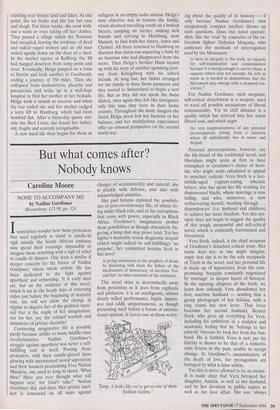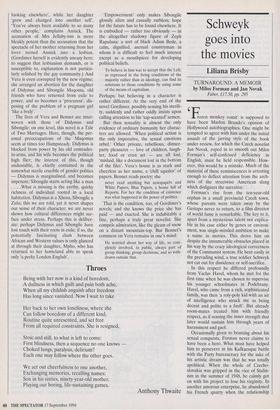But what comes after?
Nobody knows
Caroline Moore
NONE TO ACCOMPANY ME by Nadine Gordimer Bloomsbury, £15.99, pp. 324 Isometimes wonder how those protesters that used regularly to stand in candle-lit vigil outside the South African embassy now spend their evenings: impossible to imagine them switching with a sigh of relief to candle-lit dinners. One feels a similar if deeper concern for the future of Nadine Gordimer, whose whole artistic life has been dedicated to the fight against apartheid and censorship. It is early days yet, but on the evidence of this novel, which is set in the heady days of returning exiles just before the beginning of majority rule, she will not allow the change in regime to deprive her of the political mate- rial that is the staple of her imagination: not for her, yet, the relaxed warmth and intimacies of private character.
Continuing imaginative life is possible partly because, unlike so many middle-class
revolutionaries, Nadine Gordimer's struggle against apartheid was never a self- fulfilling end in itself. Passing those protesters, with their candle-glazed faces glowing with uncontested moral superiority and their banners proclaiming Free Nelson Mandela, one used to long to shout, 'What then? Have you ever thought what will happen next, for God's sake?' Nadine Gordimer did, and does. Her artistic intel- lect is armoured on all sides against
charges of sentimentality and naiveté: she is prickly with defence, and also with acknowledged anxieties.
Her past fictions explored the possibili- ties of post-revolutionary life, of whites liv- ing under black rule, and of the corruptions that come with power, especially in Black Africa. Gordimer's imagination probes these possibilities as though obsessively fin- gering a lump that may prove fatal. Yet her fighter's mentality resists diagnostic despair (which might indeed be self-fulfilling): `no purpose', her committed heroine feels in this novel
in giving satisfaction to the prophets of doom by discussing with them the failure of the mechanisms of democracy, of elections 'free and fair', in other countries of the continent.
This novel shies as determinedly away from pessimism as it does from euphoria and jubilation: it is an intelligently, almost dourly willed performance, highly impres- sive and oddly unspontaneous, as though presenting itself before a forum of interna- tional opinion. It leaves one at times worry- `Sarge, it looks like we've got us one of them fashion victims.' ing about the quality of its honesty — if only because Nadine Gordimer's own scrupulously complex intellect throws up such questions. Does this novel operate, then, like the 'trial' by comrades of the ex- freedom fighter Didymus Maqoma, who confesses the methods of interrogation used by the Movement
to show its integrity to the truth, its capacity for self-examination and condemnation because it is strong enough to survive these, a capacity others dare not attempt. He tells as much as is needed to demonstrate that the Movement may emerge with a cleansed con- science?
For Nadine Gordimer, such sceptical, self-critical detachment is a weapon, used to ward off possible accusations of liberal sentimentality. Yet its chill distance is a quality which has entered into her warm liberal soul, and which urges
the very inappropriateness of any personal preoccupations arising from a situation where all individuality was in terror and despair.
Personal preoccupations, however, are the life-blood of the traditional novel; and liberalism might seem at first to have triumphed in Gordimer's choice of hero- ine, who might seem calculated to appeal to armchair radicals. Vera Stark is a late- middle-aged yoghurt-eating, atheistic lawyer, who has spent her life working for dispossessed blacks, whose marriage is now failing, and who, moreover, is now rediscovering herself, 'working through . . . dependencies' (i.e. husband and children) to achieve her inner freedom. Yet this syn- opsis does not begin to suggest the quality of this tough, purposeful and self-critical novel, which is constantly forewarned and forearmed.
Vera Stark, indeed, is the chief recipient of Gordimer's detached critical irony. Her name does not, as one might imagine, imply that she is to be the sole receptacle of Truth in the novel; and her personal life is made up of hypocrisies, from the com- promising 'bargains constantly negotiated by marriage' to deeper layers of betrayal. In the opening chapters of the book, we learn how callously Vera abandoned her first, wartime husband — sending him a group photograph of her holiday, with a ring round her new lover. That lover becomes her second husband, Bennet Stark, who gives up everything for Vera, including his ambitions as a sculptor and academic, feeling that he 'belongs to her entirely' because he took her from her hus- band. He is faithful; Vera is not; yet his fidelity is shown to be that of a romanti- cism frozen in the past, unable to accept change. In Gordimer's anatomisation of the death of love, her protagonists are betrayed by what is false within.
Yet this is never allowed to be an excuse. It is made clear that Vera betrayed her daughter, Annick, as well as her husband, and by her devotion to public causes as well as her love affair. She was 'always looking elsewhere', while her daughter `grew and changed into another self. `You've always been available to so many other people,' complains Annick. The accusation of Mrs Jellaby-ism is more bleakly potent than the accusation that the spectacle of her mother returning from her lover turned Annick into a lesbian. (Gordimer herself is evidently uneasy here; to suggest that lesbianism demands, or is susceptible to, explanation is not particu- larly relished by the gay community.) And Vera is even corrupted by the new regime; she arranged an abortion for the daughter of Didymus and Sibongile Maqoma, old friends who have returned from exile to power, and so becomes a `procuress', 'dis- posing of the problem of a pregnant girl `like a body'.
The lives of Vera and Bennet are inter- woven with those of Didymus and Sibongile: on one level, this novel is a Tale of Two Marriages. Here, though, the per- sonal preoccupations of the Macjomas seem at times too Hampsteady. Didymus is blocked from power by his old comrades- in-arms, and his wife becomes the political high flier; the interest of this, though undeniable, is chiefly contained in the somewhat sterile crucible of gender politics — Didymus is marginalised, and becomes impotent; Sibongile starts acting like a man . . . .What is missing is the earthy, quirky richness of individual rooted in a local habitation. Didymus is a Xhosa, Sibongile a Zulu; this we are told, yet it never shapes our sense of their character; we are never shown how cultural differences might sur- face under stress. Perhaps this is deliber- ate: perhaps Didymus and Sibongile have lost touch with their roots in exile; if so, the potentially fascinating clash between African and Western values is only glanced at through their daughter, Mpho, who has returned to her homeland. able to speak only 'a perky London English'. `Empowerment' only makes Sibongile glossily alien and casually ruthless; hope for the future has to be found elsewhere. It is embodied — rather too obviously — in the altogether shadowy figure of Zeph Rapulana: a sort of black Adam Bede, a calm, dignified, asexual countryman in whom it is difficult to feel much interest except as a mouthpiece for developing political beliefs.
To believe in him was to accept that the Left, as expressed in the living conditions of the majority rather than in ideology, can find its solutions to those conditions by using some of the means of capitalism.
Perhaps; but believing in a character is rather different. At the very end of the novel Gordimer, possibly sensing his sterili- ty, suddenly and rather oddly insists upon calling attention to his 'sap-scented' semen.
But then sexuality is almost the only evidence of ordinary humanity her charac- ters are allowed. 'When political action is the only imperative, the sexual emotions rebel.' Other private, rebellious, dinner- party pleasures — love of children, laugh- ter, food or even art — are all lost, `mislaid, like a document lost in the bottom of the files'. Vera's house is as stark and cheerless as her name, a 'chill squalor' of papers. Bennet reads poetry; she
never read anything but newspape?s and White Papers, Blue Papers, a house full of Reports. For her the condition of existence was what happened in the power of politics.
That is the condition, too, of Gordimer's novels; and she knows the price she has paid — and exacted. She is indubitably a fine, perhaps a truly great novelist. She compels admiration, like the gleam of snow on a distant mountain-top. But Bennet's comment on Vera remains in one's mind:
He worried about her way of life, so com- pletely involved, in public, always part of group thinking, group decisions, and so with- drawn outside that.



























































 Previous page
Previous page